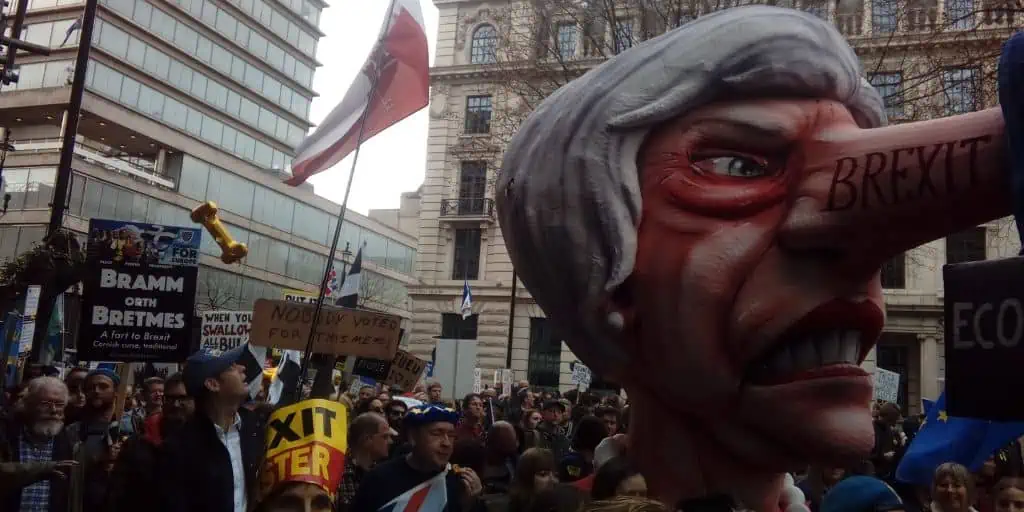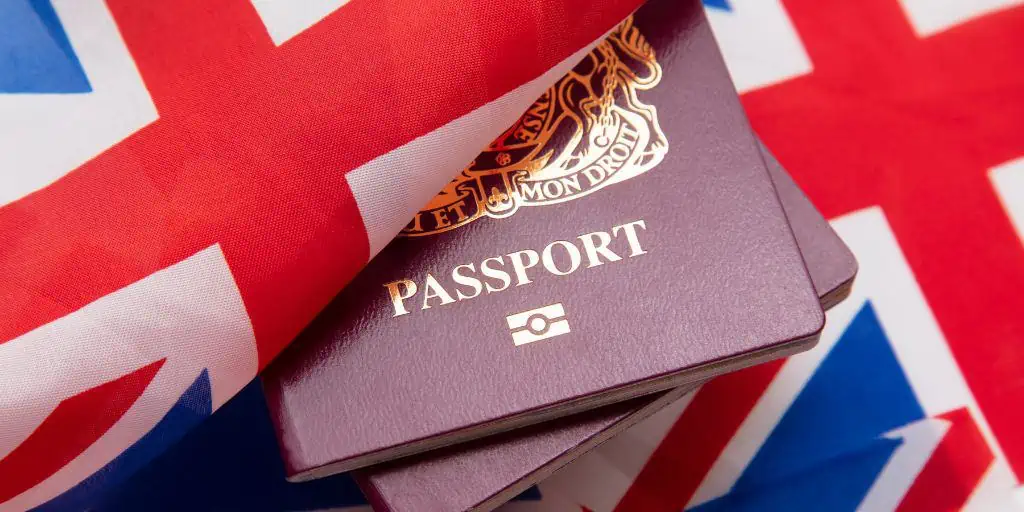What Is Brexit?
Shortcuts
- Brexit refers to the departure of the United Kingdom from the European Union, which officially occurred on January 31st, 2020.
- 51.9% of British voters voted to leave the EU during a referendum held four years prior.
- The UK wanted out of the EU due to restrictive regulatory frameworks concerning border policies, monetary policies, and trade.
- The impact of Brexit on the United States is indirect at most, especially in terms of the American influence on the rest of the EU.
- However, economic uncertainties in Britain due to the lingering effects of Brexit may have repercussions on US economic policy abroad.
Brexit Explained
Lawyer and political commentator Peter Wilding[1] coined the term “Brexit,” which he wrote about in 2012. Since then, it has been adopted as the official term for describing the United Kingdom’s exit from the European Union. Brexit is a compound word, a portmanteau of the words “Britain” and “exit.”

A Brexit Trade Deal mural that appeared on a bridge at Radley railway station (Athirty4, CC BY-SA 4.0, via Wikimedia Commons)
The decision to withdraw from the European Union became official on June 23, 2016, when the UK held a referendum on its EU membership. A referendum is simply a vote by the electorate on a political issue, law, or proposal.
It was a simple binary question:
“Should the UK leave or remain in the European Union?”
At the end of the vote, 51.9% of the total voters voted to leave[2], marking the start of Brexit proceedings.
The European Council formally received the decision in March 2017. On January 31, 2020, the United Kingdom officially ceased to be an EU member, and the British people ceased to be recognized as EU citizens.
Why Did the UK Want to Leave the EU?
Until Brexit, the UK had been in the EU since 1973[3]. As a member, it was one of the biggest contributors to the EU budget, sending over £17 billion in 2020 after rebates[4].
In return, the UK enjoyed many member-nation benefits, including participating in the world’s biggest single market with access to 450 million consumers, relaxed travel and work policies for its citizens, social renewal projects, and of course, security assurances.
That said, there had been growing pressure to hold a referendum for many years before the 2016 Brexit referendum. First off, despite its huge yearly contributions, the UK had always kept a distance from the European Union. It didn’t use the euro (€) as its primary currency, sticking instead with the pound (£). It also did not join the Schengen Agreement[5], which guarantees border-free movement within the designated Schengen Area.
Immigration was a pivotal issue in swaying the vote to “leave.” The UK wanted tighter border controls to curb the inflow of immigrants, which would have been difficult to implement as an EU member represented by the European Parliament.
Above all, the UK wanted out because the people thought it was in their best interest. When these issues became too big to ignore, they became a cornerstone topic among politicians. During his run-up to office, David Cameron[6] had promised to hold a vote on whether the UK should leave the EU. As prime minister, he made good on the promise and held the referendum.
The next day after the results were announced, he tendered his resignation. Conservative Party leader Theresa May[7] took over as prime minister and oversaw the Brexit proceedings.
Article 50 of the Lisbon Treaty
The Lisbon Treaty brought about updated regulations for the European Union. It was signed in 2007 in Lisbon, Portugal, hence the name. Article 50 of the Treaty deals with how a member nation may voluntarily leave the EU. Specifically, it states:
Any Member State may decide to withdraw from the Union in accordance with its own constitutional requirements[8].
Invoking Article 50 officially kicks off the formal withdrawal process of member countries from the European Union, which is what then-Prime Minister Theresa May did on March 29, 2017[9].

An anti-Brexit protest, 2019 (by VirtuallyLondonBecky, CC BY-SA 2.0, via Wikimedia Commons)
Transition Period, 2016–2020
During the four-year transition period, the UK and the EU negotiated the terms of Brexit while also setting out the framework for future relationships with the European Union. The process involved discussions on important considerations like free trade deals, border policies, and citizen registration rules.
During this period, the UK continued to act as a member state of the EU and complied with EU regulations; even as the British government actively worked to leave the European Union, no changes would be implemented until a Brexit deal was reached.
Another reason for the lengthy transition was the pushback from some members of parliament. Some lawmakers favored a complete exit from the EU, which meant losing benefits like participating in the single market. Others favored a more staggered approach that involved maintaining some free trade agreements with the EU.
The issue of Northern Ireland further complicated matters, as the Republic of Ireland had two governing bodies split between the UK and the EU before the Brexit referendum. With the UK completely separating from other European nations, there was much concern about future relations with Southern and Northern Ireland.
Negotiations with EU leaders were finally concluded in 2020 and included the EU-UK Trade and Cooperation Agreement[10], which outlines new favorable trade arrangements. The agreement was signed in December 2020 and came into full effect in May 2021.
The Implications of Brexit
While there are several metrics for judging the success or failure of Brexit, its economic impact remains the most compelling.
The decision to withdraw from the EU has had mixed effects on the UK’s economy. Upon receipt of the news, panic ensued as uncertainty set in across the markets leading to large capital outflows. As a result, the pound dropped in value from 1.486 to 1.369 against the U.S dollar just one day after the referendum result[11].
There were several other potential economic implications, such as reduced investments, supply chain issues, skilled worker shortages, border tariffs, and Intellectual Property (IP) regulation, among others.
The COVID-19 pandemic of 2020 did not help matters as economies worldwide experienced major setbacks and significant deviations from projected forecasts.
Brexit Positives
In a 2022 publication titled The Benefits of Brexit: How the UK is taking advantage of leaving the EU, the UK government details the biggest positives to have come out of Brexit. It’s worth noting that Boris Johnson and other pro-Brexit British officials put forth this publication.
The perceived advantages include taking back control over border and immigration policies. With the departure from EU law and subsequent increase in regulatory freedom, the government could finally introduce an upgraded system designed to attract skilled workers and make it tougher for criminals from the EU to enter the UK.
By stopping EU budget contributions, there is also more money to be directed at critical projects, such as the National Health Service (NHS), which is expected to receive tens of billions of pounds more annually than pre-Brexit numbers[12].
The money saved on yearly contributions and other related expenses has also been earmarked for programs aimed at supporting businesses, protecting the environment, improving education, and enhancing consumer rights.
Brexit’s Impact on the United States
The alliance between the US and the UK traces back over a century. Needless to say, the Brexit vote has had a few substantial impacts on US interests[13].
One of the biggest is in terms of its foreign policy. The UK was the biggest partner of the US in the European Union, supporting its policies and helping maintain a certain influence over foreign policies with member countries. This influence has shifted, if not dwindled, since Brexit became official.
The UK’s economic uncertainties can also unsettle trade relations with US institutions. This situation complicated economic policymaking as the US, much like other countries, continued reeling in the years immediately following the pandemic.
However, one area that has remained largely unaffected is defense and security agreements. The North Atlantic Treaty Organization (NATO) remains the principal security institution across the transatlantic region, and the UK remains a leading member.
Sources
- Moseley, T. (2016.) The rise of the word Brexit. British Broadcasting Corporation. Retrieved from https://www.bbc.com/news/uk-politics-37896977
- British Broadcasting Corporation. (n.d.) EU Referendum Results. Retrieved from https://www.bbc.com/news/politics/eu_referendum/results
- U.K. Parliament. (n.d.) Into Europe. Retrieved from https://www.parliament.uk/about/living-heritage/transformingsociety/tradeindustry/importexport/overview/europe/
- Keep, M. (2022). The U.K.’s contribution to the EU budget. House of Commons Library. Retrieved from https://commonslibrary.parliament.uk/research-briefings/cbp-7886/
- Federal Foreign Office of Germany. (n.d.) The Schengen Agreement. Retrieved from https://www.auswaertiges-amt.de/en/visa-service/-/231202
- GOV.UK. (n.d.) The Rt Hon David Cameron. Retrieved from https://www.gov.uk/government/people/david-cameron
- GOV.UK. (n.d.) The Rt Hon Theresa May MP. Retrieved from https://www.gov.uk/government/people/theresa-may
- Said-Moorhouse, L. (2017.) Article 50: UK’s path to Brexit, explained. CNN. Retrieved from https://edition.cnn.com/2017/01/24/europe/article-50-what-is-it/index.html
- British Broadcasting Corporation. (2017). Brexit: The U.K.’s letter triggering Article 50. Retrieved from https://www.bbc.com/news/uk-politics-39431070
- Website of the European Commission. (n.d.) The EU-U.K. Trade and Cooperation Agreement. Retrieved from https://ec.europa.eu/info/strategy/relations-non-eu-countries/relations-united-kingdom/eu-uk-trade-and-cooperation-agreement_en
- Pound Sterling Live. (n.d.) British Pound-U.S. Dollar History: 2016. Retrieved from https://www.poundsterlinglive.com/history/GBP-USD-2016
- Her Majesty’s Government. (2022.) The Benefits of Brexit: How the U.K. is taking advantage of leaving the EU. Retrieved from https://assets.publishing.service.gov.uk/government/uploads/system/uploads/attachment_data/file/1054643/benefits-of-brexit.pdf
- Jackson, J., Akhtar, S., Mix, D.(2016). Economic Implications of a United Kingdom Exit from the European Union. United States Congressional Research Service. Retrieved from https://sgp.fas.org/crs/row/R44559.pdf








